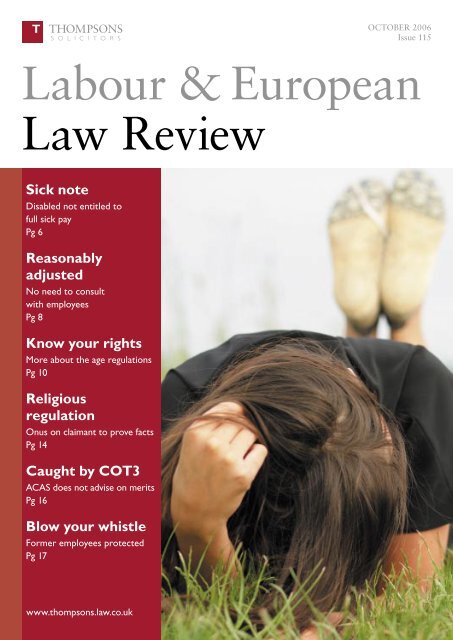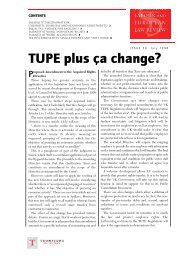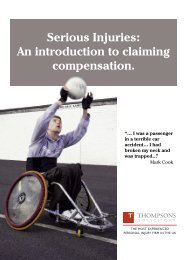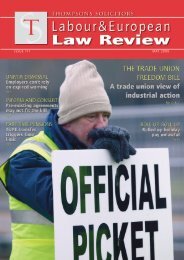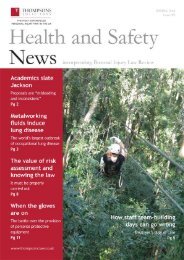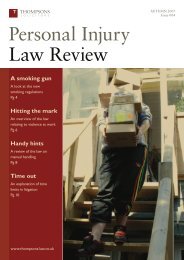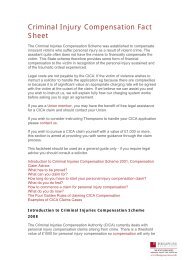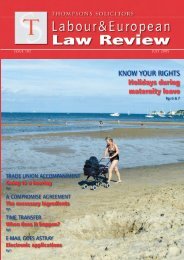PDF FILE - Thompsons Solicitors
PDF FILE - Thompsons Solicitors
PDF FILE - Thompsons Solicitors
Create successful ePaper yourself
Turn your PDF publications into a flip-book with our unique Google optimized e-Paper software.
OCTOBER 2006<br />
Issue 115<br />
Labour & European<br />
Law Review<br />
Sick note<br />
Disabled not entitled to<br />
full sick pay<br />
Pg 6<br />
Reasonably<br />
adjusted<br />
No need to consult<br />
with employees<br />
Pg 8<br />
Know your rights<br />
More about the age regulations<br />
Pg 10<br />
Religious<br />
regulation<br />
Onus on claimant to prove facts<br />
Pg 14<br />
Caught by COT3<br />
ACAS does not advise on merits<br />
Pg 16<br />
Blow your whistle<br />
Former employees protected<br />
Pg 17<br />
www.thompsons.law.co.uk
Section In the news Header<br />
In the news<br />
Surveying the scene<br />
Ready, willing and able<br />
Employers have become more aware of the<br />
importance of a good work-life balance, according<br />
to the 2004 DTI Workplace Employment Relations<br />
Survey. The report, which is the fifth in a series<br />
that started in 1980, also shows that:<br />
• fewer workplaces are reporting grievances<br />
• union representatives are working more closely with<br />
management on changes in the workplace<br />
• more representatives say that managers value their opinions<br />
• managers are more positive about the climate of<br />
employment relations<br />
• the decline in union recognition has halted in larger<br />
workplaces<br />
• employers have increased their provision of fl exible working<br />
arrangements, and<br />
• there is greater provision of leave arrangements for parents.<br />
The information for the report was collected from more than<br />
3,000 managers, nearly 1,000 employee representatives, and<br />
over 22,000 employees. Go to: www.dti.gov.uk/er/inform.htm<br />
to download a copy of the report.<br />
Over one million 50 - 65 year olds<br />
who want to work can’t get a job<br />
because employers won’t recruit<br />
older workers or retain the ones<br />
they already employ, according<br />
to a recent TUC report.<br />
The report, Ready Willing and Able,<br />
rubbishes the myth of luxury early<br />
retirement for the “baby boom”<br />
generation. Of the 2.6 million 50 - 65 year<br />
olds who are currently unemployed or<br />
economically inactive, over a third want<br />
a job, with 250,000 actively looking and<br />
750,000 who say they want work.<br />
Over the next ten years the number of<br />
people under 50 will fall by two per cent<br />
while the number aged 50 - 69 will rise<br />
by 17 per cent, massively increasing the<br />
ratio of pensioners to working people.<br />
The TUC estimates that without an<br />
extra one million people in work by<br />
2015 workers will face higher taxes,<br />
later retirement or old-age poverty.<br />
The TUC is calling on employers to carry<br />
out age audits of their staff to establish<br />
an age profi le of their workforce and<br />
negotiate an “age management” policy<br />
with trade unions and employees to<br />
eliminate age discrimination and retain<br />
older workers.<br />
It says this should include identifying and<br />
supporting training needs and offering<br />
older staff fl exible working to downshift<br />
towards retirement. To underpin such<br />
measures the Government should extend<br />
to over-fi fties the right to request to<br />
work fl exibly and the right to training<br />
with paid time off.<br />
Go to: www.tuc.org.uk/extras/over-fi ftiesunemployment.pdf<br />
to download a copy of<br />
the report.<br />
Commission reports<br />
One in ten injured at work<br />
The three statutory Commissions – the Equal<br />
Opportunities Commission, Disability Rights<br />
Commission and the Commission for Racial<br />
Equality - have recently published their annual<br />
reports.<br />
The Commission for Equality and Human Rights, to be set up in<br />
October 2007, will mean the end of the EOC and DRC in their<br />
current forms. The CRE is scheduled to be absorbed into the<br />
new Commission in 2009.<br />
Go to: www.eoc.org.uk for the full report from the<br />
Equal Opportunities Commission<br />
Go to: www.drc.gov.uk for the full report from the<br />
Disability Rights Commission<br />
Go to: www.cre.gov.uk for the full report from the<br />
Commission for Racial Equality<br />
Insurance company<br />
AXA recently published<br />
research that shows that<br />
as many as one in ten<br />
people has sustained an<br />
injury in the workplace in<br />
the past five years.<br />
Responding to the fi ndings, Tom<br />
Jones, a partner with <strong>Thompsons</strong><br />
<strong>Solicitors</strong> said: “The insurance<br />
industry has been complaining for<br />
years about the costs of paying<br />
compensation to injured people.<br />
<strong>Thompsons</strong> and the trade unions<br />
have always said that one sure<br />
way to reduce costs is to reduce<br />
workplace accidents.<br />
“AXA says that it is shocked<br />
at the number of work-related<br />
injuries sustained by employees<br />
which are the result of physical<br />
assault by customers and<br />
colleagues. We see thousands of<br />
claims every year where workers<br />
have been injured at work through<br />
a criminal act. Employers have<br />
statutory duties and yet pay lip<br />
service to it and leave frontline<br />
staff to fend for themselves.”<br />
<strong>Thompsons</strong> <strong>Solicitors</strong> are experts<br />
in all personal injury matters. Go<br />
to: www.thompsons.law.co.uk for<br />
accurate claims advice.<br />
2<br />
T H O M P S O N S S O L I C I T O R S L A B O U R & E U R O P E A N L A W R E V I E W<br />
T H O M P S O N S S O L I C I T O R S L A B O U R & E U R O P E A N L A W R E V I E W 3
In the news<br />
In the news<br />
In a recent decision – Martins v Castlehill and Bisset<br />
- the Employment Appeal Tribunal (EAT) held<br />
that time limits cannot be extended for bringing a<br />
tribunal claim under the statutory dispute resolution<br />
procedures if the discrimination claim is against<br />
another employee.<br />
Ms Martins lodged discrimination claims against both her employer<br />
and Mrs Bisset more than three months after the last incident<br />
allegedly took place. However, as she had submitted her step one<br />
grievance letter, the normal time limit was extended to six months.<br />
But as the statutory grievance procedure rules only applied to claims<br />
brought against the claimant’s employer, she could not bring the<br />
claim against her colleague as she was out of time.<br />
In coming to this conclusion, the EAT relied on section 30 of the<br />
Employment Act 2002, which states that the grievance procedure<br />
requirements are “statutorily inserted into every contract of<br />
employment”. As she did not have a contract with Mrs Bisset, the<br />
EAT reasoned that the procedure did not apply. However, as section<br />
30 has not yet come into force, the decision may be appealed.<br />
TUPE 2006<br />
Following the introduction of the Transfer of Undertakings<br />
(Protection of Employment Regulations) 2006, the DTI<br />
has now issued guidance relating to payments made by<br />
the Secretary of State to employees on insolvency and<br />
redundancy.<br />
Although the guidance makes clear that it is not an authoritative<br />
interpretation of the regulations, it sets out the approach that the Secretary<br />
of State will take in deciding liability for making payments under the<br />
provisions of:<br />
• Part XI of the Employment Rights Act 1996 (redundancy payments) and<br />
• Part XII of the 1996 Act (payments on insolvency of the employer).<br />
This guidance replaces earlier advice in relation to the 2006 TUPE regulations<br />
and insolvency. Go to: www.dti.gov.uk/fi les/fi le30031.pdf for a copy.<br />
It’s not personal<br />
All in a day<br />
The EAT, in Rainbow International v<br />
Taylor, has clarified that the extension of<br />
time under regulation 15 of the dispute<br />
resolution regulations provides for three<br />
months, not three months less one day.<br />
In this case Mr Taylor resigned on 20 June 2005,<br />
making 19 September the date by which he needed<br />
to lodge his claim. However, this was extended under<br />
the regulations by three months. As the extension<br />
began on 20 September, he had to lodge his claim by<br />
20 December, which he did.<br />
One of the essentials of a contract of employment<br />
is what the courts call “mutuality of obligation”.<br />
In other words, that one party is obliged to offer<br />
work and the other to accept it.<br />
The EAT has put a new gloss on this requirement in ABC News<br />
Intercontinental v Gizbert by ruling that Mr Gizbert (a TV<br />
reporter), was obliged to decide whether to accept or refuse<br />
assignments “in good faith”. For its part, ABC News had<br />
to provide him with a minimum of 100 days’ work per year.<br />
It argued, therefore, that there was mutuality in the arrangements<br />
and that Mr Gizbert could pursue his claim of unfair dismissal.<br />
Share and<br />
share alike<br />
The EAT has confirmed in The Print Factory<br />
(London) 1991 Ltd v Millam that tribunals cannot<br />
“lift the corporate veil” when trying to decide whether<br />
a TUPE transfer has taken place in the absence of<br />
evidence of a sham.<br />
In this case, Mr Millam worked for Fencourt Printers, which was sold to<br />
McCorquodale in 1999 as part of a share sale agreement. He was given<br />
confl icting information as to the identity of his employer, although he<br />
was paid by McCorquodale who also administered his pension.<br />
The two companies subsequently went into administration in 2005 and<br />
Mr Millam lost his job. The following day McCorquodale was bought by<br />
The Print Factory, and Mr Millam made a number of claims, including<br />
that there had been a transfer of his employment to McCorquodale.<br />
Although the Employment Tribunal agreed with him, the EAT held that<br />
the effect of the tribunal’s decision was to “lift the corporate veil”.<br />
It said that it is well established law that this can only be “pierced”<br />
where “special circumstances exist indicating that it is a mere façade<br />
concealing the true facts”.<br />
Mutually obliged<br />
4 T H O M P S O N S S O L I C I T O R S L A B O U R & E U R O P E A N L A W R E V I E W<br />
T H O M P S O N S S O L I C I T O R S L A B O U R & E U R O P E A N L A W R E V I E W 5
Disability discrimination<br />
Disability Section discrimination Header<br />
Sick note<br />
Section 3A of the Disability Discrimination Act<br />
(DDA) sets out three ways in which employers can<br />
discriminate against disabled people, one of which<br />
is a failure to make reasonable adjustments.<br />
In O’Hanlon v HM Revenue &<br />
Customs, the Employment Appeal<br />
Tribunal (EAT) said that failing to pay a<br />
disabled person full pay while on sick<br />
leave did not amount to a failure to make<br />
a reasonable adjustment.<br />
What were the basic facts?<br />
Mrs O’Hanlon started work for HMRC<br />
in 1985. She was diagnosed with clinical<br />
depression in 1988, after which she was<br />
off for long periods of sick leave.<br />
The real reason for<br />
her treatment was<br />
because she had<br />
been off work for<br />
26 weeks.<br />
• by disregarding her disability related<br />
absence for the purposes of the sick<br />
pay rules so that it did not trigger<br />
the points at which half pay and<br />
pensionable pay became payable.<br />
Her sick leave would then have<br />
totalled less than six months.<br />
What did the tribunal decide?<br />
The tribunal said that the rules on sick<br />
pay constituted a “provision, criteria or<br />
practice” which placed Mrs O’Hanlon at<br />
a substantial disadvantage in comparison<br />
with people who were not disabled.<br />
As such, the Revenue were under a<br />
duty to make reasonable adjustments. The<br />
tribunal decided that the fi rst adjustment<br />
was not reasonable, however, mainly<br />
because of cost considerations. Although<br />
the Revenue could afford to pay sick pay<br />
to Mrs O’Hanlon indefinitely, it could not<br />
sustain that approach for all its disabled<br />
employees.<br />
First of all, it pointed out that tribunals<br />
would end up “entering into a form<br />
of wage fi xing for the disabled sick”.<br />
Secondly, that the point of the Act was<br />
not to treat disabled people “as objects<br />
of charity”, but to require modifi cations<br />
to help disabled people play a full part in<br />
the “world of work”.<br />
As for the question of disability<br />
discrimination, it said that the correct<br />
comparator was someone who had<br />
not been off work at all, as opposed to<br />
someone who had been off work for<br />
non-disability related sickness.<br />
The employer was wrong to argue that<br />
it was the policy, and not the disability,<br />
that caused the difference in treatment.<br />
The real reason for her treatment was<br />
because she had been off work for 26<br />
weeks. And the underlying reason for that<br />
absence was her disability. The Revenue<br />
had, therefore, discriminated against her.<br />
The Revenue’s sick pay scheme provided<br />
for six months full pay and six months<br />
half pay, subject to a maximum of 12<br />
months paid sick leave in any four years.<br />
After that employees were only entitled<br />
to their equivalent pension rate of pay,<br />
or half pay, whichever was less.<br />
Mrs O’Hanlon lodged a tribunal claim,<br />
stating that her employers should have<br />
paid her in full by making one of the<br />
following two adjustments:<br />
• by disregarding her disability related<br />
absence for the purposes of the sick pay<br />
rules, or<br />
The tribunal also said she was not<br />
discriminated against for a reason related<br />
to her disability, given that she was treated<br />
in exactly the same way as a non-disabled<br />
person. However, it went on to say that even<br />
if it did amount to unlawful discrimination,<br />
the Revenue’s treatment of her was justified<br />
because of the costs involved.<br />
What did the EAT decide?<br />
The EAT agreed with the tribunal that<br />
Mrs O’Hanlon had been disadvantaged<br />
by the sick pay scheme rules. However,<br />
it said that it would be “a very rare case<br />
indeed” where giving higher sick pay to a<br />
disabled employee would be considered a<br />
reasonable adjustment.<br />
But was it justifi ed? The tribunal was<br />
right to decide that there was no<br />
reasonable adjustment which could be<br />
made to the level of sick pay. It also found<br />
that there were powerful economic<br />
reasons for the rule adopted, which were<br />
“material and substantial”.<br />
In any event, it said that “justifi cation<br />
could simply be the fact that the<br />
employer considered it appropriate<br />
to pay those who attend work and<br />
contribute to the operation more than<br />
those whose absence prevents that”.<br />
6<br />
T H O M P S O N S S O L I C I T O R S P E R S O N A L I N J U R Y L A W R E V I E W<br />
T H O M P S O N S S O L I C I T O R S L A B O U R & E U R O P E A N L A W R E V I E W 7
Section Disability Header discrimination<br />
Disability Section discrimination Header<br />
Reasonably<br />
Adjusted<br />
The Disability Discrimination Act (DDA) says that employers have to<br />
make “reasonable adjustments” in certain circumstances if a disabled<br />
person is placed at a substantial disadvantage in comparison with a non<br />
disabled person.<br />
In Tarbuck v Sainsbury Supermarkets<br />
Ltd (2006, IRLR 664; IDS 811), the<br />
Employment Appeal Tribunal (EAT) said<br />
that employers do not have to consult<br />
with employees before making the<br />
adjustments.<br />
The company was<br />
not required to<br />
artifi cially create a<br />
job for a disabled<br />
person.<br />
What were the basic facts?<br />
Mrs Tarbuck worked as a business analyst<br />
and IT project manager for Sainsbury. In<br />
March 2003, it was agreed after she had<br />
been off work with depression, that she<br />
should return on a part time basis to a<br />
fi xed term assignment with support from<br />
the occupational health department.<br />
In June that year she was told that<br />
she was “at risk” of redundancy, which<br />
entitled her to priority status in applying<br />
for vacant posts. She argued that the<br />
stress of being in the “at risk” category<br />
would affect her return to work, and as<br />
a result she was removed from the list.<br />
She then applied unsuccessfully for a finance<br />
systems job and complained that she had<br />
not been given priority status for the<br />
application. In October, she was offered a<br />
three month assignment but rejected it.<br />
Shortly afterwards, she was placed in the<br />
“at risk” category again, and was given<br />
formal notice of redundancy in November.<br />
Her employment ended in February 2004.<br />
Mrs Tarbuck complained of disability<br />
discrimination and unfair dismissal.<br />
What did the tribunal decide?<br />
The tribunal said that Sainsbury had failed,<br />
among other things, to consult with Mrs<br />
Tarbuck, following her objection to being<br />
put in the “at risk” category in early<br />
July 2003.<br />
Following the decision in Mid-<br />
Staffordshire General Hospitals NHS<br />
Trust v Cambridge, the tribunal said<br />
the company should have done this “to<br />
agree the particular steps to be taken<br />
to eliminate her disadvantage in the<br />
competition for jobs”.<br />
Mrs Tarbuck appealed parts of the<br />
tribunal decision, arguing that her<br />
employer should have given her priority<br />
status when she applied for the fi nance<br />
systems job. The employers crossappealed.<br />
What did the EAT decide<br />
about Mrs Tarbuck’s appeal?<br />
The EAT decided that the tribunal had<br />
not been clear in its reasoning when<br />
it held that it was not a reasonable<br />
adjustment for Sainsbury to give Mrs<br />
Tarbuck priority status again when<br />
applying for the fi nance system job. It<br />
therefore allowed her appeal on this<br />
point and remitted it to the tribunal for<br />
further consideration.<br />
However, it said that the tribunal had<br />
correctly applied the shifting burden of<br />
proof under the DDA, and that it was not<br />
necessary to ask Sainsbury to explain why<br />
they had failed to interview Mrs Tarbuck for<br />
another post that it ultimately did not fill.<br />
The company was not required to<br />
artifi cially create a job for a disabled<br />
person. She had not, therefore, been<br />
treated less favourably and the company<br />
had not failed to make a relevant<br />
adjustment in this regard.<br />
What did the EAT decide<br />
about Sainsbury’s appeal?<br />
The EAT then considered Sainsbury’s<br />
appeal. It said the tribunal had been<br />
wrong to conclude that they had failed<br />
to make a reasonable adjustment when<br />
they did not consult with her over what<br />
help she might need in fi nding alternative<br />
work. This issue had not been raised by<br />
either of the parties and so the tribunal<br />
could not raise this point unilaterally.<br />
The EAT said that there is no separate<br />
and distinct duty of reasonable<br />
adjustment on an employer to consult<br />
the disabled employee about what<br />
adjustments they should make (although<br />
it would be good practice to do so).<br />
The only relevant question was whether<br />
the employer had complied with their<br />
obligations or not. That being so, Mid-<br />
Staffordshire General Hospitals NHS<br />
Trust v Cambridge had been incorrectly<br />
decided.<br />
8<br />
T H O M P S O N S S O L I C I T O R S L A B O U R & E U R O P E A N L A W R E V I E W<br />
T H O M P S O N S S O L I C I T O R S L A B O U R & E U R O P E A N L A W R E V I E W 9
Age regulations<br />
Age Section regulations Header<br />
You’re how old?<br />
Now that the age discrimination regulations have<br />
come into effect (see LELR 114 for an outline),<br />
employees have the right to request to work<br />
beyond their retirement date.<br />
Richard Arthur, a solicitor from<br />
<strong>Thompsons</strong> Employment Rights Unit in<br />
London, looks at two specifi c aspects of<br />
the regulations –transitional provisions<br />
and retirement dismissals.<br />
What are the standard rules?<br />
For people retiring with “expiry dates”<br />
on or after 1 April 2007, the standard<br />
rules will apply.<br />
The regulations impose two notifi cation<br />
duties on employers:<br />
(i) an employer intending to “retire” an<br />
employee must notify the employee in<br />
writing of the employee’s right to make<br />
a request and the date on which they<br />
intend to retire the employee between<br />
six months and one year before the<br />
intended date of retirement<br />
(the “Paragraph 2 Duty”)<br />
(ii) where an employer fails to comply<br />
with their Paragraph 2 Duty, they<br />
have a continuing duty to notify the<br />
employee as in (i) until the fourteenth<br />
day before the operative date of<br />
termination (the “Paragraph 4 Duty”).<br />
Details about the employee’s procedure<br />
for making a request to stay on, the right<br />
to a meeting to discuss the request, the<br />
right to be accompanied and the right<br />
of appeal can be found in LELR 114.<br />
What are the transitional<br />
provisions?<br />
If the “expiry date” is on or after 1<br />
October 2006, but before 1 April 2007,<br />
the regulations set out transitional<br />
arrangements which apply in four<br />
different circumstances.<br />
For people retiring<br />
with “expiry dates”<br />
on or after 1 April<br />
2007, the standard<br />
rules will apply.<br />
What happens if four weeks’<br />
notice is given before<br />
1 October?<br />
If the employer gives notice before<br />
1 October of at least the period required<br />
by the contract of employment (or at<br />
least four weeks) to expire before 1<br />
April 2007; the employer has made the<br />
employee aware before 1 October 2006<br />
that they consider that the employee<br />
is being retired on the expiry date; and<br />
on or as soon as is practicable after<br />
1 October, the employee notifi es the<br />
employer in writing of their right to<br />
make a request, the employer is treated<br />
as complying with their Paragraph 2 Duty.<br />
An employee’s request to stay on,<br />
which otherwise complies with the<br />
requirements described in LELR 114,<br />
will be valid if made:<br />
• where practicable, at least four weeks<br />
before the expiry date or<br />
• where this is not practicable, as soon<br />
as reasonably practicable (either before<br />
or after the expiry date), but not more<br />
than four weeks after the expiry date.<br />
If the employer fails to notify the employee<br />
on or as soon as reasonably practicable<br />
after 1 October of their right to make a<br />
request to stay on, the Paragraph 2 Duty<br />
does not apply and the Paragraph 4 Duty<br />
applies up to the expiry date.<br />
The employee can make a request to stay<br />
on either before or after notifi cation.<br />
T H O M P S O N S S O L I C I T O R S L A B O U R & E U R O P E A N L A W R E V I E W 11
Age regulations<br />
Age regulations<br />
What happens if less than four<br />
weeks notice is given before<br />
1 October?<br />
If the employer gives notice before<br />
1 October which will expire before 1<br />
April 2007, but the period of notice given<br />
is less than four weeks (irrespective of<br />
what is provided for in the contract: or<br />
the employer has not made the employee<br />
aware before 1 October that they<br />
consider the employee is being retired<br />
on the expiry date; and on or as soon as<br />
reasonably practicable after 1 October,<br />
the employer notifi es the employee in<br />
writing of their right to make a request,<br />
the employer is treated as complying with<br />
their Paragraph 2 Duty.<br />
How do unions work out the reason for dismissal?<br />
The reason for dismissal can be worked out using the following table<br />
(remembering that any retirement age below age 65 needs objective justifi cation):<br />
Normal retirement<br />
age (“NRA”)<br />
Date of termination Employer’s compliance with notifi cation requirements Reason for dismissal<br />
1 None Before age 65 Not retirement<br />
2 None At or after age 65<br />
3 None At or after age 65<br />
4 None At or after age 65<br />
5 None At or after age 65<br />
Employer complies with Paragraph 2 Duty;<br />
contract terminates on “intended date”<br />
Employer complies with Paragraph 2 Duty;<br />
contract terminates before “intended date”<br />
Employer fails to comply with Paragraph 2 Duty;<br />
contract terminates before “intended date”<br />
Any other case where employer fails to comply with<br />
Paragraph 2 Duty<br />
Retirement<br />
Not retirement<br />
Not retirement<br />
Could be retirement<br />
6 Yes Before NRA Not retirement<br />
The employee has the right to make a<br />
request to stay on. If the employer fails<br />
to notify the employee on or as soon as<br />
reasonably practicable after 1 October of<br />
their right to make a request, the Paragraph<br />
2 Duty does not apply and the Paragraph 4<br />
Duty applies up to the expiry date.<br />
What happens if notice is<br />
given on or after 1 October?<br />
If the employer gives notice on or after<br />
1 October as required by the contract (or<br />
statutory, if longer) to expire before 1 April<br />
2007; and before, or the same day as giving<br />
notice of dismissal, the employer notifies<br />
the employee in writing of their right to<br />
make a request, the employer is treated as<br />
complying with their Paragraph 2 Duty.<br />
The employee has the right to make a<br />
request to stay on. If the employer fails<br />
to notify the employee before, or on the<br />
same day as, giving notice of dismissal<br />
of their right to make a request, the<br />
Paragraph 2 Duty does not apply and<br />
the Paragraph 4 Duty applies up to the<br />
expiry date.<br />
If the employer gives notice on or after<br />
1 October which is shorter than the<br />
contractual notice (or the statutory<br />
notice, if longer) to expire before 1 April<br />
2007, then the Paragraph 2 Duty does not<br />
apply and the Paragraph 4 Duty applies<br />
up to the expiry date. The employee can<br />
make a request to stay on.<br />
What are retirement dismissals?<br />
The age regulations have also introduced<br />
a new potentially fair reason for dismissal<br />
- retirement. Although employees over<br />
the age of 65 now have the right to claim<br />
unfair dismissal, retirement dismissals<br />
over age 65 will almost always be fair if<br />
the employer complies with their<br />
notifi cation obligations.<br />
However, it is clear that some employers<br />
have already dismissed older workers<br />
before 1 October to prevent the over 65s<br />
from acquiring the right to claim unfair<br />
dismissal. Unions will need to be astute to<br />
identify the real reason for dismissal.<br />
It is clear that some employers have<br />
already dismissed older workers before<br />
1 October to prevent the over 65s<br />
from acquiring the right to claim unfair<br />
dismissal.<br />
7 65 or higher On or after NRA<br />
8 65 or higher On or after NRA<br />
9 65 or higher On or after NRA<br />
10 65 or higher On or after NRA<br />
11 Below 65 On or after NRA<br />
12 Below 65 On or after NRA<br />
13 Below 65 On or after NRA<br />
14 Below 65 On or after NRA<br />
What if the reason “could be”<br />
retirement?<br />
If the reason for the dismissal “could be”<br />
retirement, a tribunal will have “particular<br />
regard” to the following criteria, to<br />
determine if the reason is actually<br />
retirement or not:<br />
• whether or not the employer complied<br />
with their Paragraph 4 Duty<br />
• if so, when and<br />
• whether or not the employer followed<br />
or sought to follow the procedures for<br />
holding a meeting to consider a request.<br />
Employer complies with Paragraph 2 Duty;<br />
contract terminates on “intended date”<br />
Employer complies with Paragraph 2 Duty;<br />
contract terminates before “intended date”<br />
Employer fails to comply with Paragraph 2 Duty;<br />
contract terminates before “intended date”<br />
Any other case where employer fails to comply with<br />
Paragraph 2 Duty<br />
If the retirement age can not be objectively justifi ed,<br />
not retirement<br />
Employer complies with Paragraph 2 Duty;<br />
contract terminates on “intended date”<br />
Employer complies with Paragraph 2 Duty;<br />
contract terminates before “intended date”<br />
Any other case where employer fails to comply with<br />
Paragraph 2 Duty<br />
Where the reason (or principal reason)<br />
for the dismissal is retirement, the<br />
employee is regarded as unfairly dismissed<br />
if, and only if, the employer has failed to<br />
comply with<br />
• their Paragraph 4 Duty (assuming<br />
they didn’t comply with their Paragraph<br />
2 Duty)<br />
• their duties to consider a request and<br />
arrange a meeting or<br />
• their duty to consider an appeal.<br />
Retirement<br />
Not retirement<br />
Not retirement<br />
Could be retirement<br />
If the retirement age can not be<br />
objectively justifi ed, not retirement<br />
If the retirement age can be<br />
objectively justifi ed, retirement<br />
Even if the retirement age can be<br />
objectively justifi ed, not retirement<br />
Could be retirement<br />
Stop Press: Pensions<br />
provision delayed<br />
The Government has<br />
announced that it is to delay the<br />
implementation of the pensions<br />
provisions, apparently to allow<br />
more time for employers to “get<br />
to grips with them”. These are now<br />
expected to be implemented on<br />
1 December, following an additional<br />
mini-consultation.<br />
12 T H O M P S O N S S O L I C I T O R S L A B O U R & E U R O P E A N L A W R E V I E W<br />
T H O M P S O N S S O L I C I T O R S L A B O U R & E U R O P E A N L A W R E V I E W 13
Religion and belief<br />
Religion and belief<br />
Religious regulation<br />
In discrimination cases, the law says that workers<br />
have to identify facts from which a tribunal<br />
could conclude that there has been unlawful<br />
discrimination before the burden of proof<br />
passes to the employer.<br />
In Mohmed v West Coast Trains<br />
Ltd (the fi rst decision on religious<br />
discrimination), the Employment Appeal<br />
Tribunal (EAT) said that tribunals could,<br />
at that fi rst stage, also take into account<br />
facts put forward by the employer that<br />
disproved what the worker was alleging.<br />
What were the basic facts?<br />
Mr Mohmed worked for West Coast<br />
Trains Ltd as a customer services assistant<br />
from June 2003 to February 2004. A<br />
Muslim of Indian origin, his religion<br />
dictated that his beard should be about<br />
four inches in length.<br />
The company gave Mr Mohmed a copy<br />
of its uniforms policy at the start of his<br />
probationary period, which made clear<br />
that his beard should be kept neat and<br />
tidy. Towards the end of his training<br />
period in August, he was asked to trim his<br />
beard and according to the company, the<br />
issue was resolved by September.<br />
According to Mr Mohmed, however, his<br />
manager continued to complain about his<br />
beard until early December, shortly after<br />
the religion and belief regulations (RBR)<br />
came into force on 2 December 2003.<br />
Mr Mohmed was dismissed in February<br />
“for lack of enthusiasm”. He claimed<br />
direct and indirect racial and religious<br />
discrimination, harassment and<br />
victimisation.<br />
What did the tribunal decide?<br />
The tribunal decided, on the facts before<br />
it, that the issue of Mr Mohmed’s beard<br />
had been resolved by about September.<br />
That meant that his case did not fall<br />
within the RBR.<br />
In any event, it said that Mr Mohmed had<br />
not satisfi ed stage one of the test set<br />
down by the Court of Appeal in Igen v<br />
Wong Ltd (LELR 99). In other words,<br />
that he had not proven, on the balance<br />
of probabilities, facts from which the<br />
tribunal could conclude that the company<br />
had committed an unlawful act of<br />
discrimination.<br />
The tribunal had<br />
to follow the<br />
Court of Appeal’s<br />
guidance in Igen.<br />
What did the parties argue on<br />
appeal?<br />
Mr Mohmed argued that regulation 29 of<br />
the RBR required the tribunal to apply the<br />
two stage test in Igen. At the fi rst stage, it<br />
must only look at the facts put forward by<br />
the claimant, and must disregard any nondiscriminatory<br />
explanation put forward by<br />
the respondent.<br />
The company, on the other hand, said that<br />
there was no requirement on tribunals<br />
just to look at the facts put forward by<br />
the claimant. It argued that the onus was<br />
on the claimant to prove those facts at that<br />
stage. If the company was able to produce<br />
evidence that the tribunal preferred, then<br />
the fact would not be proved.<br />
What did the EAT decide?<br />
And the EAT agreed with the company.<br />
It said that Mr Mohmed had to prove<br />
facts from which a tribunal could infer<br />
that the company had treated him less<br />
favourably than a hypothetical non-Muslim<br />
comparator on grounds of his religion<br />
or belief.<br />
To ascertain those facts, the tribunal had<br />
to follow the Court of Appeal’s guidance<br />
in Igen. This stated that tribunals could<br />
not take the employer’s explanation for<br />
his dismissal (in other words, his lack of<br />
enthusiasm) into account at stage one.<br />
However, if tribunals could only take<br />
account of facts relied on by the claimant,<br />
it would have to ignore all the facts put<br />
forward by the company. In this case, facts<br />
about its uniforms policy that required<br />
beards to be kept neat and tidy; and the<br />
fact that it had a Sikh employee who<br />
conformed with that policy.<br />
The EAT concluded the tribunal was<br />
right to decide that the issue of his beard<br />
had nothing “to do with his religion and<br />
everything to do with the company’s<br />
concern to enforce its uniform standard”.<br />
Mr Mohmed had not satisfi ed the<br />
fi rst stage of the Igen test and there<br />
had not, therefore, been any unlawful<br />
discrimination.<br />
T H O M P S O N S S O L I C I T O R S L A B O U R & E U R O P E A N L A W R E V I E W 15
Duties of ACAS officers<br />
Caught by COT3<br />
Under section 18 of the Employment Tribunals Act (ETA), ACAS<br />
officers have a duty “to endeavour to promote a settlement”.<br />
Whistle blowing<br />
Blow your whistle<br />
Section 47(B)(1) of the 1996 Employment Rights Act (ERA) states that “a<br />
worker has the right not to be subjected to any detriment by any act, or any<br />
deliberate failure to act, by his employer done on the ground that the worker<br />
has made a protected disclosure”.<br />
In Clarke and ors v Redcar and<br />
Cleveland Borough Council; Wilson<br />
and ors v Stockton on Tees Borough<br />
Council (2006, IRLR 324; IDS 811),<br />
the Employment Appeal Tribunal (EAT)<br />
has said that that duty does not require<br />
offi cers to give advice as to the merits of<br />
a claim.<br />
What were the facts?<br />
In May 2003, Redcar Council agreed with<br />
the recognized unions to implement<br />
the 1997 single status (or Green Book)<br />
agreement introducing a new pay<br />
structure with effect from 1 April 2004.<br />
It also started negotiations with ACAS<br />
and the unions to settle the potential<br />
claims of employees up to the date of<br />
implementation, based on their length of<br />
service and hours of work.<br />
At around the same time, a number of<br />
women employees lodged equal pay<br />
claims, comparing themselves with men in<br />
predominantly male-dominated jobs. The<br />
Council admitted it was in breach of the<br />
Equal Pay Act.<br />
The negotiations with the unions<br />
continued and in January 2004, ACAS<br />
produced a COT3 (or conciliated<br />
agreement), in “full and fi nal settlement”<br />
of all claims in connection with the terms<br />
of the women’s contracts. A covering<br />
letter from the Council made clear that<br />
employees who accepted the offer would<br />
forfeit their statutory rights to bring<br />
equal pay claims.<br />
A large number of women accepted the<br />
negotiated deal, but then lodged equal<br />
pay claims, as did women working for<br />
Stockton Borough Council where similar<br />
facts applied.<br />
What did the tribunal decide?<br />
The tribunal struck out the women’s<br />
claims on the ground that they had been<br />
validly settled up to the date when they<br />
signed and returned the COT3, although<br />
not up to 1 April 2004.<br />
This was despite the fact that the<br />
claimants “were not aware of the<br />
possibility that they could receive a more<br />
substantial amount if the case was taken<br />
to a tribunal and they were successful”.<br />
Nor were the agreements void for<br />
“unconscionable conduct” by the<br />
employers, but even if there had been<br />
such conduct, the tribunal said that the<br />
claimants had endorsed the COT3 by<br />
receiving and cashing their settlement<br />
cheques.<br />
The women appealed, arguing that the<br />
ACAS offi cer had not fulfi lled her duties<br />
under section 18, as the agreement had<br />
not been made “with the assistance of a<br />
conciliation offi cer” as required under<br />
section 77 of the Sex Discrimination Act.<br />
What did the EAT decide?<br />
The EAT said that the COT3 was<br />
valid and that the claimants could not<br />
therefore bring equal pay claims.<br />
It looked in particular at the duties of an<br />
ACAS conciliation offi cer under section<br />
18 of the Employment Tribunals Act, and<br />
set out the following principles:<br />
• ACAS offi cers have no responsibility to<br />
ensure that the terms of the settlement<br />
are fair on the employee<br />
• the expression “promote a settlement”<br />
must be given a liberal construction,<br />
depending on the circumstances of the<br />
particular case<br />
• ACAS offi cers must not give advice<br />
about the merits of a case<br />
• Tribunals must not consider whether<br />
the ACAS offi cer correctly interpreted<br />
their duties; the offi cer just has to have<br />
intended to act as per section 18<br />
• if the ACAS offi cer acted in bad faith<br />
or adopted unfair methods when<br />
promoting a settlement, the agreement<br />
might be set aside and might not<br />
operate as a bar to proceedings.<br />
Contrary to what the claimants argued,<br />
therefore, offi cers were not under a duty<br />
to give advice, to evaluate the claims and<br />
to ensure that the claimants understood<br />
the nature and extent of all their<br />
potential claims.<br />
Finally, the EAT said that the tribunal<br />
was wrong to hold that each COT3 only<br />
settled the claimants’ equal pay claims up<br />
to the date on which they signed. Instead,<br />
it made an order that the agreements<br />
settled the claims up to 1 April 2004.<br />
The Court of Appeal has decided in<br />
Woodward v Abbey National plc<br />
(2006, IRLR 677) that that protection<br />
applies to former employees, as well as<br />
existing ones.<br />
What were the basic facts?<br />
Mrs Woodward was head of fi nancial<br />
institutions for Abbey National plc from<br />
1991 until she was made redundant<br />
in 1994. She complained in 2003 that<br />
the company had subjected her to a<br />
detriment, contrary to section 47B of the<br />
ERA, because she had blown the whistle<br />
on various dubious fi nancial practices<br />
while she was still an employee.<br />
She alleged that, since leaving the<br />
company, it had failed to provide her<br />
with a number of references that she<br />
had requested and failed to try to fi nd<br />
her any alternative employment.<br />
What did the tribunals<br />
decide?<br />
The tribunal decided that it could not<br />
hear her claim because it was bound by<br />
the 2001 Court of Appeal decision in the<br />
case of Fadipe v Reed Nursing Personnel,<br />
barring claims relating to events that take<br />
place after the person’s employment<br />
has ended.<br />
And it distinguished the decision of<br />
the House of Lords in Rhys-Harper<br />
v Relaxion Group Plc which said that<br />
workers could bring claims, post<br />
termination of employment, on the<br />
basis that “rights enshrined within the<br />
Employment Rights Act do not in general<br />
terms, apply to incidents occurring after<br />
the termination of employment, whereas<br />
the Discrimination Acts do”.<br />
The EAT also said it was bound by Fadipe<br />
and that it had not been overruled by<br />
Rhys-Harper, because the latter only<br />
related to discrimination complaints.<br />
Should Fadipe be overturned?<br />
The Court of Appeal said that the fi rst<br />
question to answer was whether Fadipe<br />
should be overturned.<br />
It looked at the relevant legislation – the<br />
ERA and the discrimination legislation –<br />
and concluded that although the language<br />
and framework were slightly different<br />
in each, they were all dealing with the<br />
same concept. In other words, to protect<br />
employees “from detriment in retaliation<br />
for his or her sex, race, disability or<br />
whistle-blowing….All four Acts are,<br />
therefore, dealing with victimisation in<br />
one form or another. If the common<br />
theme is victimisation, it would be odd<br />
indeed if the same sort of act could be<br />
victimisation for one purpose, but not for<br />
the other”.<br />
Secondly, it said that it was absurd to<br />
limit victimisation to acts during an<br />
employment contract, as opposed to<br />
events after termination. The Court<br />
said that it was diffi cult to believe that<br />
Parliament could have intended to let<br />
employers discriminate in giving or<br />
withholding references for existing<br />
employees but perfectly lawful in the<br />
case of ex-employees.<br />
On that basis, the Court ruled that<br />
Fadipe was inconsistent with the wider<br />
application given by their Lordships in<br />
Rhys-Harper and could not stand.<br />
The Court concluded “It simply makes<br />
no sense at all to protect the current<br />
employee but not the former employee,<br />
especially since the frequent response of<br />
the embittered exposed employer may<br />
well be dismissal and a determination to<br />
make life impossible for the nasty little<br />
sneak for as long thereafter as he can.<br />
If it is in the public interest to blow the<br />
whistle, and the Act shows that it is, then<br />
he who blows the whistle should be<br />
protected when he becomes victimised<br />
for doing so, whenever the retribution<br />
is exacted”.<br />
Comment<br />
This is a sensible decision by the<br />
Court of Appeal and means that<br />
whistle blowers with claims of post<br />
employment victimisation receive<br />
the same protection as those with<br />
post employment claims of race,<br />
sex or disability. However, although<br />
the Court now recognises that such<br />
claims are possible in practice, it is<br />
notoriously diffi cult to prove the link<br />
between the negative reference and<br />
the protected conduct.<br />
16 T H O M P S O N S S O L I C I T O R S L A B O U R & E U R O P E A N L A W R E V I E W<br />
T H O M P S O N S S O L I C I T O R S L A B O U R & E U R O P E A N L A W R E V I E W 17
Redundancy consultation<br />
Redundancy consultation<br />
Giving notice<br />
Section 188 of the Trade Union and Labour<br />
Relations (Consolidation) Act 1992 states that<br />
employers have to consult with unions (and<br />
stipulates the time scale in which it must happen)<br />
before going ahead with any redundancies.<br />
In Vauxhall Motors Ltd v Transport<br />
and General Workers Union (2006,<br />
IRLR 674), the Employment Appeal<br />
Tribunal (EAT) said that although section<br />
188 does not have an unlimited shelf life,<br />
employers do not have to issue fresh<br />
notices if a subsequent consultation<br />
relates to the same employees and the<br />
same prospective redundancies.<br />
What were the basic facts?<br />
In 2002, the company hired hundreds<br />
of temporary workers on fi xed term<br />
contracts. In January 2003, it notifi ed<br />
the DTI that it would be making 400 of<br />
them redundant between 25 April and 5<br />
September. It also sent the information<br />
required under TULRCA to the union.<br />
Following consultations with the union,<br />
no one was made redundant in 2003,<br />
but in March 2004 the company, without<br />
informing the union, requested and<br />
received a six-month extension to the<br />
application registered with the DTI in<br />
January 2003.<br />
In September, the company told the<br />
union there would be no compulsory<br />
redundancies, but lodged a new notification<br />
with the DTI of 345 potential redundancies<br />
between October 2004 and September<br />
2005. It did not give the union a copy.<br />
In October 2004, over 300 redundancies<br />
were announced at Ellesmere Port.<br />
The trade union side argued that the<br />
remaining temporary employees (of<br />
whom only about 46 remained) should be<br />
joined with the other employees affected<br />
by the proposed restructuring.<br />
The company argued that it could rely<br />
on the statutory information supplied to<br />
the union in January 2003, and dismissed<br />
the 46 temporary employees on 26<br />
November 2004. The union argued that<br />
the company had breached its section<br />
188 obligations.<br />
What does the law say?<br />
Section 188, TULRCA says:<br />
(1) An employer proposing to dismiss<br />
as redundant an employee of a<br />
description in respect of which an<br />
independent trade union is recognised<br />
by him shall consult representatives<br />
of the union about the dismissal in<br />
accordance with this section.<br />
(2) The consultation must begin at the<br />
earliest opportunity, and in any event–<br />
(a) where the employer is proposing to<br />
dismiss as redundant 100 or more<br />
employees at one establishment<br />
within a period of 90 days or less, at<br />
least 90 days before the fi rst of those<br />
dismissals takes effect;<br />
(b) where the employer is proposing<br />
to dismiss as redundant at least 10<br />
but less than 100 employees at one<br />
establishment within a period of 30<br />
days or less, at least 30 days before the<br />
fi rst of those dismissals takes effect.<br />
What did the tribunal decide?<br />
And the tribunal agreed. It said that “a<br />
redundancy situation cannot be an on-going<br />
piece of elastic as the respondent would<br />
wish it in this case. …We do not accept the<br />
submission of the respondents that Section<br />
188 offers an “unlimited shelf-life”.<br />
The tribunal went on to fi nd that the<br />
company had not consulted meaningfully<br />
with the union after 27 September 2004,<br />
nor had it sent the union the mandatory<br />
information required by section 188(4).<br />
It ordered the company to pay a 70-day<br />
protective award in favour of the 46<br />
dismissed employees.<br />
What did the EAT decide?<br />
Although the EAT agreed with the<br />
tribunal that section 188 did not provide<br />
an unlimited shelf-life, it did not agree that<br />
it had been exhausted in this case. Instead<br />
it said that, provided the consultation<br />
deals with the same employees and the<br />
same prospective redundancies, the<br />
employer would not be in breach of<br />
section 188.<br />
In this case, there had been an on-going<br />
dialogue about the status, extension and<br />
transfer of the temporary employees<br />
from February 2003 until the dismissals<br />
in November 2004. The entire consultation<br />
process had therefore continued seamlessly.<br />
The elastic did not break and a fresh<br />
section 188 process was not triggered.<br />
It also said that the reference in section<br />
188 to a period of 90 days did not<br />
mean that if the process of consultation<br />
extended beyond that period, it then<br />
had to restart. The 90-day period fi xed<br />
the start of consultation, not the end.<br />
18 T H O M P S O N S S O L I C I T O R S L A B O U R & E U R O P E A N L A W R E V I E W 19
<strong>Thompsons</strong> is the largest specialised personal<br />
injury and employment rights law firm in the<br />
UK with an unrivalled network of offices and<br />
formidable resources.<br />
HEAD OFFICE<br />
Congress House,<br />
Great Russell Street,<br />
LONDON WC1B 3LW<br />
020 7290 0000<br />
BELFAST<br />
028 9089 0400<br />
BIRMINGHAM<br />
0121 262 1200<br />
BRISTOL<br />
0117 304 2400<br />
CARDIFF<br />
029 2044 5300<br />
CHELMSFORD<br />
01245 228 800<br />
DURHAM<br />
0191 3845 610<br />
EDINBURGH<br />
0131 225 4297<br />
GLASGOW<br />
0141 221 8840<br />
HARROW<br />
020 8872 8600<br />
LEEDS<br />
0113 205 6300<br />
LIVERPOOL<br />
0151 2241 600<br />
MANCHESTER<br />
0161 819 3500<br />
MIDDLESBROUGH<br />
01642 554 162<br />
NEWCASTLE UPON TYNE<br />
0191 269 0400<br />
NOTTINGHAM<br />
0115 989 7200<br />
PLYMOUTH<br />
01752 675810<br />
SHEFFIELD<br />
0114 270 3300<br />
SOUTHAMPTON<br />
023 8021 2040<br />
SOUTH SHIELDS<br />
0191 4974 440<br />
STOKE-ON-TRENT<br />
01782 406 200<br />
SWANSEA<br />
01792 484 920<br />
Visit us at www.thompsons.law.co.uk<br />
Email us at lelrch@thompsons.law.co.uk<br />
LELR aims to give news and views on employment law<br />
developments as they affect trade unions and their members.<br />
This publication is not intended as legal advice on<br />
particular cases.<br />
Download this issue at www.thompsons.law.co.uk<br />
Editor: Alison Clarke<br />
Design & production: Clinic<br />
Print: www.dsigroup.com/talisman<br />
To receive regular copies of LELR email:<br />
lelrch@thompsons.law.co.uk<br />
Contributors to this edition:<br />
Richard Arthur, Charlotte Moore, Rakesh Patel,<br />
Victoria Phillips, Jo White


